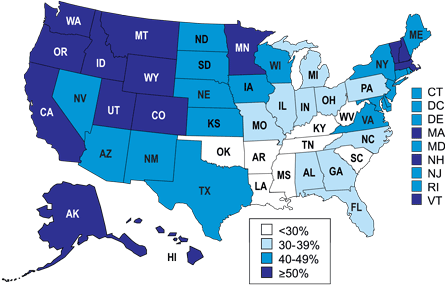| Percent of Children Who Are Breastfed at 6 Months of Age, Among Children Born in 2007 (Provisional) |
|---|
 |
| Source: National Immunization Survey, Centers for Disease Control and Prevention, Department of Health and Human Services |
The Report card shows that the breastfeeding numbers are stagnating and have remained the same at both 6 and 12 months. Midwifery Today Magazine says:
"According to the report, among infants born in 2007, 75% were breastfed in the very early postpartum days, but six months later only 43% of babies were receiving any breast milk. By 12 months, fewer than one in four infants was being breastfed (22%). Both numbers are below national targets of 50% breastfeeding at 6 months and 25% breastfeeding at 12 months."Considering the First Lady's push to increase national breastfeeding rates to help reduce the national problem of obesity, it would seem that it's going to take more than just a statement telling people to breastfeed to actually get them to do it.
In the report SOLVING THE PROBLEM OF CHILDHOOD OBESITY WITHIN A GENERATION-White House Task Force on Childhood Obesity Report to the President
under the section dealing with Breastfeeding, the report recognizes the dangers that infant formula feeding holds out to infants and the importance of hospitals achieving "Baby Friendly" Status:
The protective effect of breastfeeding likely results from a combination of factors. First, infant formula contains nearly twice as much protein per serving as breast milk. This excess protein may stimulate insulin secretion in an unhealthy way.82 Second, the biological response to breast milk differs from that of formula. When feeding a baby, the mother’s milk prompts the baby’s liver to release a protein that helps regulate metabolism.83 Feeding formula instead of breast milk increases the baby’s concentrations of insulin in his or her blood, prolongs insulin response,84 and, even into childhood, is associated with unfavorable concentrations of leptin, a hormone that inhibits appetite and controls body fatness.85 Despite the well-known health benefits of breastfeeding and the preference of most pregnant women to breastfeed,86 numerous barriers make breastfeeding difficult. For first-time mothers, breastfeeding can be challenging, even for those who intend to breastfeed. For those who have less clear intent to breastfeed, cultural, social, or structural challenges can prevent breastfeeding initiation or continuation. For example, immediately after birth, many babies are unnecessarily given formula and separated from their mothers, making it harder to start and practice breastfeeding. Also, hospital staff are often insufficiently trained in breastfeeding support.
The Joint Commission on the Accreditation of Hospitals, the body that accredits hospitals and health care organizations for most State Medicaid and Medicare reimbursement, now expects hospitals to track and improve their rates of exclusive breastfeeding. Hospitals that meet specific criteria for optimal breastfeeding-related maternity care are designated as “Baby Friendly” by Baby-Friendly U.S.A. This non-governmental organization has been named by the U.S. Committee for UNICEF as the designating authority for UNICEF/WHO standards in the United States. Currently only 3% of births in America occur in Baby-Friendly facilities.87
While breastfeeding could be far more widespread than it is today, it is not a viable alternative for all mothers and babies. Specific guidance and support options should also be made available for those who cannot breastfeed. (*2) Parents and caregivers of babies also may benefit from guidance about when to start feeding them solid foods, since early introduction of solids (prior to six months) increases the risk for childhood obesity.88
But as I said, it's going to take more that eloquent words from the First Lady to fix a problem that has the weight of a couple of generations to keep pushing it forward. Unless they plan to put words into action and actually DO something, Breastfeeding Rates WILL remain stagnant. Pretty words don't create support programs to educate both medical personnel and families on the technical aspects of breastfeeding nor the importance of breastfeeding- both for an infants immediate needs and their health in the future. We need to change these upcoming generations to create a positive environment for breastfeeding. Until Breastfeeding is treated as the NORMAL way to feed babies, and governments back their words up with solid actions- like instituting the WHO Code into the federal legal system- the average person will continue to turn to infant formula as an "option" for feeding their babies.
